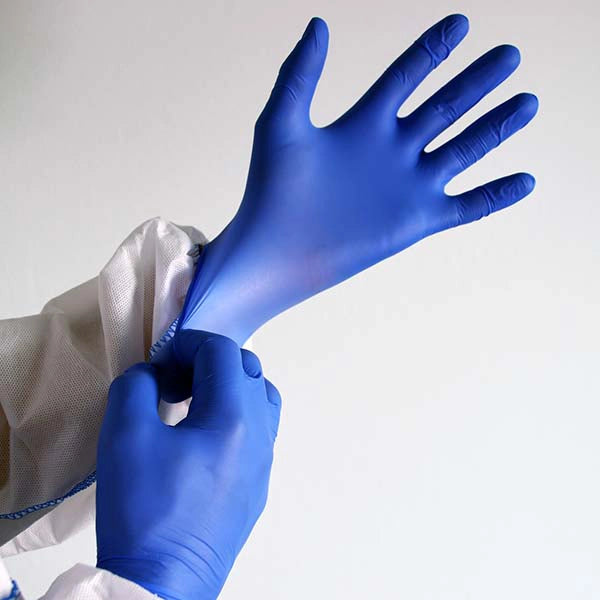As a mechanic, your hands are your most valuable tools. You rely on them to perform intricate tasks, handle heavy machinery, and work with potentially hazardous substances.
That's where nitrile gloves come in. They provide a barrier between your skin and the grime, chemicals, and sharp edges you encounter on the job.
But with so many options on the market, how do you choose the best nitrile gloves for your needs? This guide will help you understand the different types of nitrile gloves available and how to select the right pair for your work.
What are Nitrile Gloves?
Nitrile gloves are made from a synthetic rubber compound called nitrile butadiene rubber (NBR). This material is known for its excellent resistance to oils, fuels, and many chemicals.
Nitrile gloves are a popular choice for mechanics because they offer superior durability and protection compared to latex or vinyl gloves. They are also latex-free, making them a safe option for those with latex allergies.
Types of Nitrile Gloves for Mechanics
When it comes to selecting the best nitrile gloves for your needs as a mechanic, you'll find several types available, each with its own advantages.
Disposable Nitrile Gloves
Disposable nitrile gloves are a popular choice for mechanics who need a reliable barrier against grease, oil, and chemicals. These gloves are designed for single use, making them ideal for tasks that require frequent glove changes. They come in various thicknesses, typically ranging from 3 mil to 8 mil, allowing you to choose the level of protection and dexterity you need.
Heavy-Duty Nitrile Gloves
For more demanding tasks, heavy-duty nitrile gloves offer increased durability and protection. These gloves are thicker than disposable nitrile gloves, usually 8 mil or more, providing better resistance against punctures, tears, and abrasions. They are an excellent choice when working with sharp tools or handling heavy equipment.
Textured Nitrile Gloves
Textured nitrile gloves feature a raised pattern on the surface, enhancing your grip on tools and parts. This added texture helps prevent slippage, especially when working with oily or wet components. Textured nitrile gloves are available in both disposable and heavy-duty options, allowing you to choose the right combination of grip and protection for your specific tasks.
Extended Cuff Nitrile Gloves
Extended cuff nitrile gloves provide additional protection for your wrists and forearms. These gloves feature a longer cuff that extends beyond the wrist, preventing dirt, debris, and chemicals from entering the glove. They are particularly useful when working in tight spaces or reaching into engine compartments where your arms may be exposed to potential hazards.
When choosing the best nitrile gloves for your needs, consider the specific tasks you'll be performing and the level of protection, dexterity, and durability required. Whether you opt for disposable, heavy-duty, textured, or extended cuff nitrile gloves, you can be confident that you're investing in the safety and performance of your most valuable tools – your hands.
5 Best Nitrile Gloves for Mechanics
When it comes to protecting your hands while working on cars, not all nitrile gloves are created equal. Here are five top-performing options that provide the durability, dexterity, and protection you need to tackle any task in the garage.
1. HandCare Black Nitrile Gloves - Exam Grade, Powder Free (6 Mil)
The HandCare Black Nitrile Gloves offer a robust combination of durability and dexterity, making them a versatile choice for mechanics. With a 6-mil thickness, these gloves are thick enough to protect against punctures and tears while still allowing for the flexibility needed to handle intricate tasks. The black color also helps to hide dirt and grease, maintaining a professional appearance throughout your workday. Additionally, these gloves are latex-free, reducing the risk of allergic reactions.
- Thickness: 6 Mil
- Key Features: Provides a strong balance of durability and dexterity. Suitable for mechanics who need reliable protection against punctures and tears without sacrificing flexibility.
- Best For: Mechanics who need reliable protection without compromising on comfort and flexibility.
2. Dark Light Black Nitrile Gloves - Exam Grade, Powder Free (9 Mil)
The Dark Light Black Nitrile Gloves are designed for the toughest jobs. With a 9-mil thickness, they offer superior puncture resistance, making them ideal for mechanics working with sharp tools, heavy machinery, or in environments where maximum protection is a must. Despite their thickness, these gloves maintain a level of dexterity that allows for precise movements, essential for detailed automotive work. The dark black color not only looks sleek but also conceals grime and oil, making them perfect for heavy-duty tasks.
- Thickness: 9 Mil
- Key Features: Heavy-duty gloves offering exceptional puncture resistance, ideal for more demanding tasks involving sharp tools and rough surfaces.
- Best For: Mechanics who require heavy-duty protection, especially when dealing with sharp objects or rough materials.
3. HandCare Orange Nitrile Gloves - Powder Free (8 Mil)
These HandCare Orange Nitrile Gloves are a great choice for mechanics who need both visibility and protection. With an 8-mil thickness, these gloves provide excellent durability, standing up to the toughest challenges in the garage. The bright orange color enhances visibility, making it easier to spot your hands during intricate tasks or in low-light conditions. These gloves are also textured for improved grip, ensuring that you can maintain control of tools and parts even in slippery conditions.
- Thickness: 8 Mil
- Key Features: High-visibility gloves that provide enhanced protection. The thick design ensures durability in heavy-duty environments.
- Best For: Mechanics who need high-visibility gloves with enhanced protection for demanding tasks.
4. ASAP T-Grip Orange Nitrile Gloves - Powder Free (7 Mil)
The ASAP T-Grip Orange Nitrile Gloves are engineered for those who need a secure grip in challenging environments. These 7-mil gloves feature a unique textured surface that enhances grip, making them ideal for mechanics working with oily or wet components. The orange color also adds a layer of visibility, which can be crucial when working in complex engine compartments or tight spaces. These gloves strike a balance between durability and tactile sensitivity, offering protection without sacrificing the ability to handle delicate parts.
- Thickness: 7 Mil
- Key Features: Textured for improved grip, making them suitable for tasks requiring precision handling, especially in oily or wet conditions.
- Best For: Mechanics needing superior grip and visibility, particularly in wet or oily conditions.
5. ADVANCE Blue Nitrile Gloves - Exam Grade, Powder Free (5 Mil)
The ADVANCE Blue Nitrile Gloves provide an excellent balance between protection and dexterity, making them suitable for a wide range of tasks in the automotive industry. With a 5-mil thickness, these gloves offer enough durability to resist punctures and tears while still allowing for the tactile sensitivity required for precise work. The blue color gives these gloves a clean, professional look, and they are powder-free, reducing the risk of contamination. These gloves are ideal for tasks that demand a combination of protection and flexibility.
- Thickness: 5 Mil
- Key Features: Offers a good balance between protection and tactile sensitivity, ideal for detailed work that requires both durability and dexterity.
- Best For: Mechanics who need a versatile glove that provides both protection and dexterity for a variety of tasks.
Benefits of Using Nitrile Gloves for Mechanics
Nitrile gloves offer several key benefits that make them an ideal choice for mechanics. Understanding these advantages can help you make an informed decision when selecting the best gloves for your work.
Superior Puncture and Tear Resistance
One of the most significant benefits of nitrile gloves is their exceptional puncture and tear resistance. Nitrile is a synthetic rubber compound that is inherently stronger and more durable than latex or vinyl. This means that nitrile gloves are less likely to puncture or tear when working with sharp tools or rough surfaces, providing you with reliable protection throughout your shift.
Enhanced Grip and Dexterity
Nitrile gloves are designed to provide a snug and comfortable fit, allowing for excellent dexterity and tactile sensitivity. Many nitrile gloves feature textured fingertips or palms, enhancing your grip on tools and parts, even in oily or wet conditions. This improved grip and dexterity can help you work more efficiently and precisely, reducing the risk of accidents or errors.
Chemical and Oil Resistance
Mechanics often work with a variety of chemicals, including solvents, lubricants, and oils. Nitrile gloves provide superior resistance to these substances compared to latex or vinyl gloves. They are less likely to degrade or break down when exposed to chemicals, ensuring that your hands remain protected. This chemical resistance also helps extend the life of the gloves, making them a cost-effective choice in the long run.
Latex-Free and Allergy-Friendly
Latex allergies are a growing concern in the workplace, and mechanics are no exception. Nitrile gloves are an excellent alternative for those with latex sensitivities or allergies. They are completely latex-free, eliminating the risk of allergic reactions or skin irritation. By choosing nitrile gloves, you can ensure a safer and more comfortable working environment for yourself and your colleagues.
How to Choose the Right Nitrile Gloves for Mechanics
When selecting the best nitrile gloves for your needs as a mechanic, there are several factors to consider. Taking the time to evaluate these aspects will ensure that you invest in gloves that provide optimal protection, comfort, and performance.
Consider the Thickness and Durability
Nitrile gloves come in various thicknesses, typically measured in mils (1 mil = 0.001 inch). Thicker gloves offer greater durability and resistance to punctures and tears, making them suitable for heavy-duty tasks. However, increased thickness may reduce dexterity and tactile sensitivity. Assess the specific requirements of your work and choose a glove thickness that balances protection and flexibility.
Look for Textured Palms and Fingertips
Textured palms and fingertips are a valuable feature in nitrile gloves for mechanics. The raised pattern on the glove surface enhances grip, particularly when handling oily or slippery components. Improved grip reduces the risk of dropped tools or parts, promoting safety and efficiency in your work. When evaluating gloves, look for those with a well-designed texture that provides a secure hold without compromising dexterity.
Ensure Proper Fit and Comfort
A proper-fitting glove is essential for both comfort and performance. Nitrile gloves that are too loose may hinder your ability to grip tools securely, while gloves that are too tight can cause discomfort and fatigue. When trying on gloves, ensure that they fit snugly around your fingers and palm without restricting movement. Many manufacturers offer gloves in different sizes, so take the time to find the right fit for your hands.
Check for Chemical Resistance Ratings
As a mechanic, you likely work with various chemicals, including solvents, oils, and lubricants. While nitrile gloves generally provide good chemical resistance, some gloves are specifically designed to withstand certain substances. Check the glove packaging or manufacturer's information for chemical resistance ratings. If you frequently work with specific chemicals, choose gloves that are rated for those particular substances to ensure maximum protection.
The best mechanic gloves offer a combination of durability, dexterity, and protection against common hazards in the automotive industry. They are designed to withstand the rigors of daily use while providing the flexibility needed for intricate tasks. When evaluating your options, consider gloves with reinforced palms, padded knuckles, and touchscreen-compatible fingertips for added functionality and convenience.
Tips for Prolonging the Life of Your Nitrile Gloves
As a mechanic, you rely on your nitrile gloves to protect your hands from grease, grime, and potential hazards. Maximizing the lifespan of your gloves not only saves you money but also reduces waste. Here are some practical tips to help you extend the life of your nitrile gloves.
Avoid Excessive Stretching and Pulling
Nitrile gloves are designed to be durable, but they have their limits. Avoid stretching or pulling your gloves excessively when putting them on or taking them off. Excessive stretching can cause the gloves to thin out and become more prone to tears and punctures. Instead, gently roll the cuff of the glove down to your wrist and then carefully slide your hand inside.
Store Gloves in a Cool, Dry Place
Proper storage plays a significant role in preserving the quality of your nitrile gloves. Keep your gloves in a cool, dry place away from direct sunlight and extreme temperatures. Exposure to heat and UV rays can cause the nitrile material to degrade over time, making the gloves more susceptible to damage. Consider storing your gloves in a designated drawer or container to protect them from dust and debris.
Change Gloves Frequently
One of the most effective ways to prolong the life of your nitrile gloves is to change them frequently. Don't wait until your gloves are heavily soiled or damaged to replace them. Regularly inspect your gloves for signs of wear, such as thinning material, punctures, or tears. If you notice any damage, dispose of the gloves and put on a fresh pair. Changing gloves frequently not only ensures optimal protection but also prevents the buildup of dirt and chemicals that can degrade the nitrile material.
Use the Right Glove Size
Wearing the correct glove size is essential for both comfort and durability. Gloves that are too small can cause excessive stretching and tearing, while gloves that are too large may hinder dexterity and increase the risk of accidents. When selecting nitrile gloves, refer to the manufacturer's sizing chart and choose a size that fits snugly without being restrictive. A well-fitting glove will provide better protection and last longer than an ill-fitting one.
Where to Buy the Best Nitrile Gloves for Mechanics?
When choosing the best nitrile gloves for mechanics, it's essential to consider durability, dexterity, and protection against chemicals. gloves.com offers a wide selection of high-quality nitrile gloves designed to meet the specific needs of mechanics, ensuring your hands stay safe and comfortable on the job.
Shop the Best Nitrile Gloves for Mechanics and save up to 50% here





